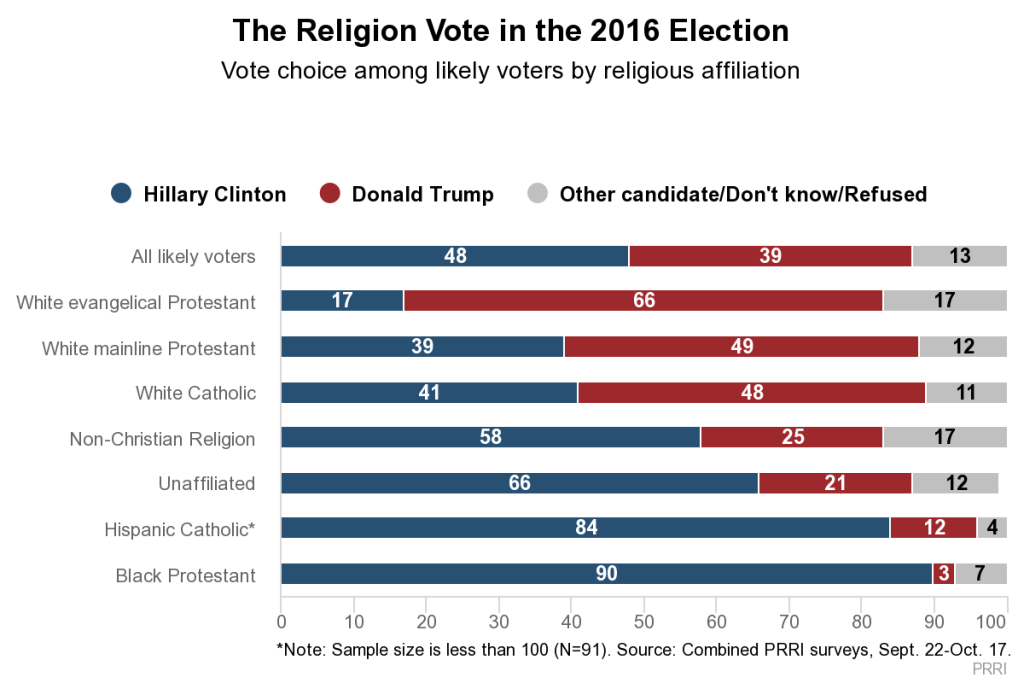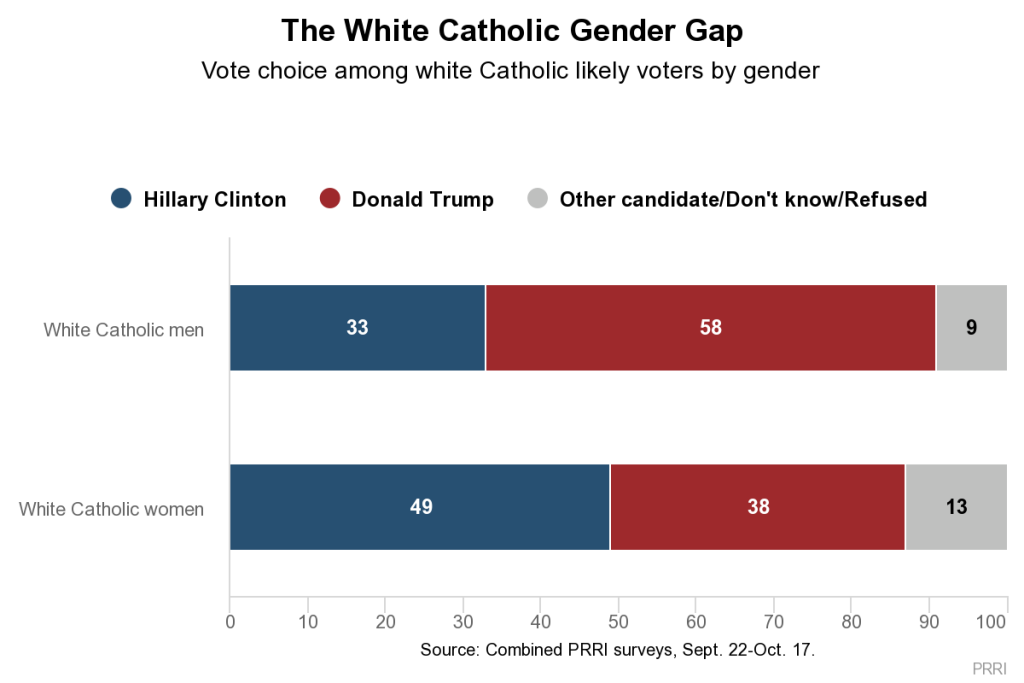American voters’ presidential preferences are sharply divided along religious lines.
As has been true of past presidential contests, Republican Donald Trump receives strong support among white Christian voters while his Democratic opponent, Hillary Clinton, is performing equally well, if not better, among non-Christian, religiously unaffiliated, and non-white Christian voters.1 However, at this stage of the campaign, Trump is underperforming among white mainline Protestants and white Catholics compared to Romney in 2012.
 No religious group is more strongly backing Trump’s candidacy than white evangelical Protestants. Roughly two-thirds (66%) of white evangelical Protestant voters report they will vote for or are leaning towards supporting Trump, while only 17% say they are supporting Clinton. Nearly half of white mainline Protestant voters (49%) and white Catholic voters (48%) favor Trump while about four in ten of each group (39% and 41%) support Clinton. Conversely, Clinton enjoys a sizable advantage over Trump among non-Christian voters (58% vs. 25%), and unaffiliated voters (66% vs. 21%), and has an overwhelming lead among Hispanic Catholic voters (84% vs. 12%) and black Protestant voters (90% vs. 3%).2 Unlike white evangelical Protestants who strongly support Trump, nonwhite evangelical Protestant voters—a category that includes black, Hispanic, and Asian-Pacific Islander Protestants—are backing Clinton over Trump by a nearly equally wide margin (67% vs. 24%).
No religious group is more strongly backing Trump’s candidacy than white evangelical Protestants. Roughly two-thirds (66%) of white evangelical Protestant voters report they will vote for or are leaning towards supporting Trump, while only 17% say they are supporting Clinton. Nearly half of white mainline Protestant voters (49%) and white Catholic voters (48%) favor Trump while about four in ten of each group (39% and 41%) support Clinton. Conversely, Clinton enjoys a sizable advantage over Trump among non-Christian voters (58% vs. 25%), and unaffiliated voters (66% vs. 21%), and has an overwhelming lead among Hispanic Catholic voters (84% vs. 12%) and black Protestant voters (90% vs. 3%).2 Unlike white evangelical Protestants who strongly support Trump, nonwhite evangelical Protestant voters—a category that includes black, Hispanic, and Asian-Pacific Islander Protestants—are backing Clinton over Trump by a nearly equally wide margin (67% vs. 24%).
 A gender gap in vote preference is evident across religious groups, but it is much more pronounced in some groups than others. More than seven in ten (71%) white evangelical Protestant male voters express support for Trump, compared to 60% of white evangelical Protestant female voters. There is similar sized gap among white mainline Protestant voters. A majority (54%) of white mainline Protestant male voters favor Trump, while fewer than one-third (31%) are supporting Clinton. White mainline Protestant female voters are divided with an equal number expressing support for Trump (45%) as Clinton (45%). White Catholic voters have a much more pronounced gender gap: Nearly six in ten (58%) white Catholic male voters favor Trump, compared to only 38% of white Catholic female voters. Nearly half (49%) of white Catholic female voters are backing Clinton.
A gender gap in vote preference is evident across religious groups, but it is much more pronounced in some groups than others. More than seven in ten (71%) white evangelical Protestant male voters express support for Trump, compared to 60% of white evangelical Protestant female voters. There is similar sized gap among white mainline Protestant voters. A majority (54%) of white mainline Protestant male voters favor Trump, while fewer than one-third (31%) are supporting Clinton. White mainline Protestant female voters are divided with an equal number expressing support for Trump (45%) as Clinton (45%). White Catholic voters have a much more pronounced gender gap: Nearly six in ten (58%) white Catholic male voters favor Trump, compared to only 38% of white Catholic female voters. Nearly half (49%) of white Catholic female voters are backing Clinton.
1 Results for this analysis were derived by aggregating four independent surveys conducted between Sept. 22 to Oct. 17. The combined telephone surveys all share the same methodology (RDD telephone). The combined data was then re-weighted to ensure that the demographic characteristics of the sample closely approximate the overall characteristics of the U.S. adult population. All references to “voters” are “likely voters” in this analysis.
2 The results for Hispanic Catholic voters includes fewer than 100 respondents (N=91) and should be interpreted with caution.


